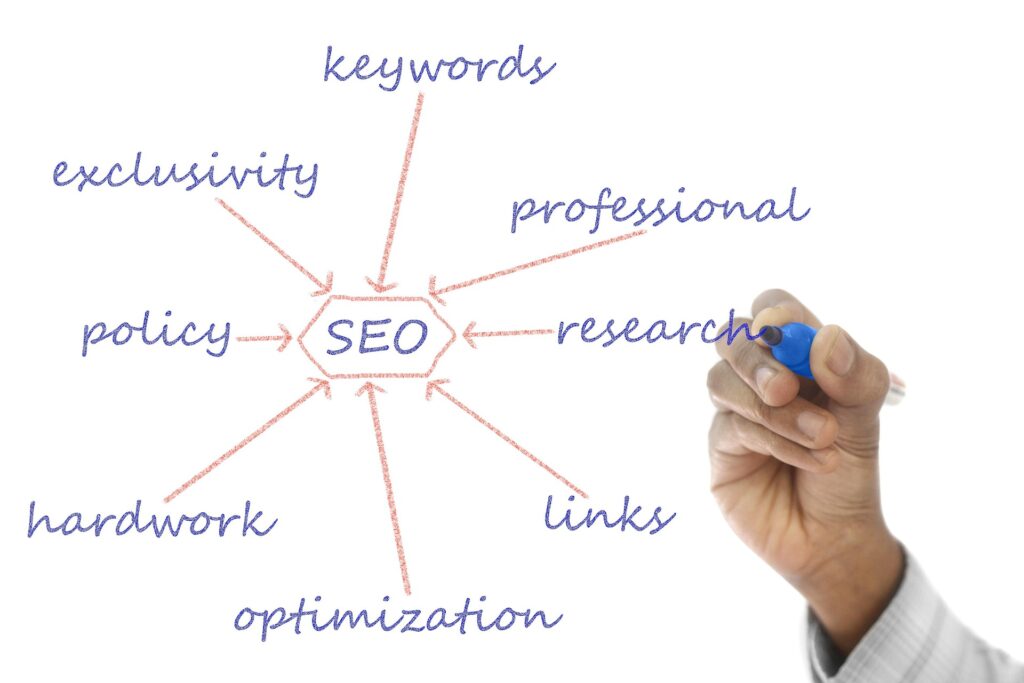I’ve spent nearly two decades watching SEO evolve, and if there’s one thing I’ve learned, it’s that Google and other search engines love moving the goalposts. Every time you think you’ve cracked the code, they release an update that makes your hard-earned rankings wobble like a Jenga tower on a rickety table. At Above Bits, we’ve been deep in the SEO trenches, helping businesses in Charlotte and across North Carolina navigate the ever-changing search landscape. But here’s the thing: the SEO game isn’t just changing—it’s being rewritten.
For years, keywords have been the backbone of optimization. Get the right ones, sprinkle them throughout your site, and watch the traffic roll in. But as we step into 2025, it’s becoming painfully clear that keywords alone are no longer the golden ticket to ranking success. Google, Bing, and even lesser-known search engines like Yandex and Baidu have been pushing for something more—context, relevance, and user intent. Let’s explain why search engines are moving past keywords and what it means for businesses trying to survive in this new SEO era.
The Death of Exact Match Keywords (And Why It Happened)
There was a time when you could rank for “best pizza in Charlotte” simply by stuffing that phrase into your content as many times as possible. Google caught on to this trick ages ago, introducing penalties for keyword stuffing. But even after that, the game continued—people started using exact match domains, obsessing over keyword density, and even hiding text filled with keywords in white font on white backgrounds. Clever, right? Not anymore.
Google’s AI-driven algorithms, especially BERT and MUM, have shifted focus away from how many times a keyword appears and instead analyze what a page is actually about. The algorithm now understands synonyms, related phrases, and even sentiment. This means that an article titled “Where to Find the Tastiest Slices in Charlotte” can outrank one called “Best Pizza in Charlotte” if it offers better, more engaging, and useful information.
And it’s not just Google making these moves. Microsoft’s Bing, often overlooked in the SEO world, has made similar changes with its Turing Natural Language Generation (T-NLG) model, processing search queries more like a human brain and less like a machine scanning for specific words.
For businesses relying on old-school keyword tactics, this is bad news. But it’s a golden opportunity for those who focus on quality content, user experience, and actual value.
Charlotte SEO Agencies That Don’t Adapt Are in Trouble

If you run a Charlotte SEO agency and still build strategies around “keyword stuffing light” (yes, that’s still a thing), you’re in for a rough ride. The idea that ranking well comes from hitting a magic percentage of keyword occurrences is now laughable. Instead, Google and other search engines prioritize content that meets a user’s search intent, is well-structured, and keeps visitors engaged.
But what does that mean in real terms? It means that content should actually answer the user’s question, be supported by authoritative sources, and be part of a well-optimized website that loads quickly, looks great on mobile, and isn’t stuffed with intrusive ads or pop-ups. This isn’t speculation—it’s backed by Google’s own Helpful Content Update, which specifically targets sites with low-value, keyword-heavy fluff.
At Above Bits, we’ve adjusted our approach for clients, moving beyond outdated keyword tactics to something much more powerful. This SEO strategy focuses on user experience, data-driven content, and technical optimizations. Businesses that work with us see the difference quickly.
The Rise of AI and How It’s Changing Search
If you thought search engines were improving their reading ability, think again. They’re now using AI to generate their own content. Google’s Search Generative Experience (SGE) and Microsoft’s integration of ChatGPT into Bing have introduced AI-generated answers right at the top of search results, sometimes without even showing website links.
This has sparked panic among businesses relying on organic traffic. If Google starts answering user questions without sending people to websites, what happens to SEO? The reality is complex. While some websites have seen clicks drop, others have benefited by optimizing for AI search results rather than traditional rankings.
SEO strategies must now include structured data, conversational query matching, and authoritative backlinks more than ever. A Charlotte SEO agency that ignores AI advancements risks losing its relevance in a world where search is becoming more interactive and predictive.
Why Some Websites Are Losing Traffic Despite “Great SEO”

I’ve heard it dozens of times: “But our SEO is solid! Why are we losing traffic?” The answer isn’t always obvious, but in most cases, it comes down to two things—technical SEO issues and poor content engagement.
Technical SEO has never been more critical. Google has started prioritizing Core Web Vitals, measuring page speed, interactivity, and visual stability. If your website loads slowly, shift content while loading, or has unnecessary bloated code, it’s going to drop in rankings—even if the content is fantastic.
We’ve seen real-world cases where sites that once ranked well plummeted after Google’s page experience updates. One company came to Above Bits for help after losing 40% of its organic traffic in just three months. The culprit? A slow-loading site filled with unoptimized JavaScript, third-party tracking scripts, and poorly implemented caching. A deep dive into Google’s PageSpeed Insights revealed that their mobile experience was a disaster. After cleaning up their back-end, fixing their site speed, and optimizing their images, they saw a 30% traffic recovery within two months.
And then there’s engagement. Google tracks how long people stay on your page and whether they immediately bounce back to the search results. If users don’t engage with your content, Google assumes it isn’t relevant—even if you’ve optimized everything else correctly.
Why Big Brands Are Dominating Search Results (Even When Their Content is Bad)
One of the most frustrating aspects of modern SEO is that big brands often rank higher, even when their content is clearly inferior. Small businesses in Charlotte and elsewhere feel the sting when they craft high-quality content only to see a massive company outrank them with a generic, lackluster page.
The reason? Domain authority and brand recognition. Google has been giving more weight to trusted sources, even if their content isn’t always the best. This is why sites like Amazon, Forbes, and Wikipedia dominate so many searches.
But there’s hope. While it’s hard to beat a billion-dollar company in pure domain strength, smaller businesses can still win by targeting long-tail searches, creating ultra-relevant content, and improving on-page engagement. Search engines reward sites that provide clearer, more in-depth answers than their competitors, even if those competitors are more prominent brands.
At Above Bits, we’ve worked with businesses in Charlotte and beyond to outmaneuver industry giants through hyper-targeted content strategies and technical SEO expertise. It’s not about outspending the big guys—it’s about outsmarting them.
The Future of Search: Is Google Still King?
For years, Google has dominated the search industry, holding over 91% of the global market share. But cracks are forming in the empire. Alternative search engines like Bing, DuckDuckGo, and even You.com, which integrates AI-generated responses, are gaining traction.
Bing’s integration with OpenAI’s ChatGPT has made it more than just a Google alternative—it’s become a real contender in the AI-driven search era. Microsoft’s investment in AI is changing how people interact with search engines, offering direct, conversational responses instead of endless pages of links. While Bing still has a long way to go in terms of market share, the fact that it’s challenging Google’s monopoly on search behavior is a significant shift.
Meanwhile, privacy-focused search engines like DuckDuckGo have found a loyal audience of users tired of Google’s data tracking. While DuckDuckGo isn’t nearly as powerful in terms of SEO complexity, it rewards clean, well-structured websites with solid on-page optimization. Businesses looking to rank across multiple platforms can’t afford to focus solely on Google anymore.
For a Charlotte SEO agency, this means adapting strategies to work across various search engines, not just optimizing for Google’s ever-changing algorithm. It’s no longer enough to follow one search engine’s rules—SEO has to be multi-platform, AI-aware, and constantly evolving.
The Rise of Voice Search and Why It’s Harder Than It Looks
Another major trend in SEO is voice search optimization. With the rise of smart assistants like Alexa, Siri, and Google Assistant, more users are speaking their queries rather than typing them. In fact, studies show that over 50% of online searches are now voice-based.
But here’s the challenge—voice search results are even more competitive than traditional search results. Unlike a regular search where users can see multiple links, voice search only returns one answer—the top result. This means ranking for voice queries requires a different approach than traditional SEO.
Google tends to pull voice search answers from featured snippets, which means structured data, conversational language, and mobile-friendly content are now more critical than ever. While voice search presents a massive opportunity, it also raises concerns about visibility. If Google or Amazon starts keeping users inside their ecosystems by offering direct answers instead of leading them to websites, businesses may see a decline in organic traffic.
At Above Bits, we’re helping businesses in Charlotte optimize for these shifts by focusing on structured data, schema markup, and AI-assisted content structuring. Voice search isn’t just a novelty—it’s an entirely new way to compete in rankings.
Mobile-First Indexing and Why Your Desktop Site Doesn’t Matter Anymore
There was a time when websites were designed for desktops first and mobile second. That time is long gone. Google’s mobile-first indexing means that a site’s mobile performance is the primary factor for search rankings, regardless of how great the desktop version looks.
Yet, so many businesses still treat mobile optimization as an afterthought. I can’t tell you how often I’ve seen a beautifully designed website that looks flawless on a 27-inch monitor but turns into a chaotic mess on a smartphone. This is a problem not just for rankings but for user experience.
Over 65% of all Google searches now come from mobile devices, which is even higher for local businesses in Charlotte and North Carolina. If a website is slow, unresponsive, or frustrating to navigate on the phone, potential customers are gone in seconds—and Google notices.
One of the businesses’ biggest mistakes is assuming that “responsive design” is enough. In reality, Google’s Core Web Vitals update has raised the bar. Now, search rankings depend on things like:
- Largest Contentful Paint (LCP): How fast the largest element on the page loads.
- First Input Delay (FID): How quickly users can interact with a page.
- Cumulative Layout Shift (CLS): How much the page shifts around as it loads.
Businesses in Charlotte that rely on an outdated website are unknowingly handing their competitors an advantage. At Above Bits, we’ve worked with companies to rebuild their mobile experiences from the ground up, ensuring that technical issues aren’t destroying their rankings.
The Dark Side of SEO: When Google Penalizes You for Doing Too Much
SEO is a delicate balancing act. Do too little, and your website fades into obscurity. Do too much, and you might get penalized for over-optimization. Google has a long history of cracking down on sites that try to game the system, from link farms to aggressive backlink buying.
The most notorious penalty was Google’s Penguin Update, which wiped out thousands of websites overnight for using shady backlink strategies. But penalties aren’t just a thing of the past. Google continues to devalue spammy tactics in real-time, meaning businesses trying to cut corners with SEO could find themselves buried in search results faster than ever.
This means playing by the rules for a Charlotte SEO agency while still being competitive. It’s a fine line between strategic optimization and triggering Google’s spam filters. At Above Bits, we’ve seen cases where businesses unknowingly hurt their rankings by hiring “cheap SEO experts” who built toxic backlinks that had to be manually disavowed later.
SEO isn’t about finding loopholes—it’s about long-term growth, technical expertise, and an understanding of what search engines actually want. The days of gaming the system are over.
Why SEO is No Longer Just About Google—It’s About the Entire Web
While Google remains the dominant force in SEO, search behavior has expanded beyond traditional search engines. People now look for businesses on YouTube, TikTok, Amazon, Instagram, and even Reddit before they ever open Google.
This shift means that SEO strategies must extend beyond just search engine rankings. A business that dominates in search but ignores video content, social proof, and online reputation is leaving money on the table.
Platforms like TikTok and YouTube Shorts have changed how people discover brands. Google has even begun indexing video snippets in search results, meaning video SEO is now critical to ranking success. If your business isn’t creating engaging video content, you’re missing out on a huge chunk of traffic.
At Above Bits, we’ve helped businesses in Charlotte integrate multi-channel SEO strategies that go beyond just website optimization. The future of search is fragmented across multiple platforms, and businesses that adapt will be the ones that thrive.
Wrapping It Up: The New Rules of SEO
SEO in 2025 isn’t about gaming the system—it’s about understanding search behavior, optimizing for AI, and creating genuinely valuable content. The old rules of stuffing keywords and chasing backlinks are fading away, replaced by user experience, technical performance, and multi-platform presence.
For businesses that don’t adapt, the future is bleak. Search engines are getting smarter, competition is fiercer, and outdated strategies are being left behind. But there’s more opportunity than ever for those who embrace the change.
If you’re looking for a Charlotte SEO agency that understands the modern landscape of search, you need a team that stays ahead of the curve. Above Bits has spent years refining SEO strategies that actually work, helping businesses navigate the constant shifts in search engine algorithms.
Want to see how we can transform your rankings? Visit Above Bits, a Charlotte SEO agency, and talk about the future of your online presence.
You might also like : Premier SEO Services for Top Google Rankings







